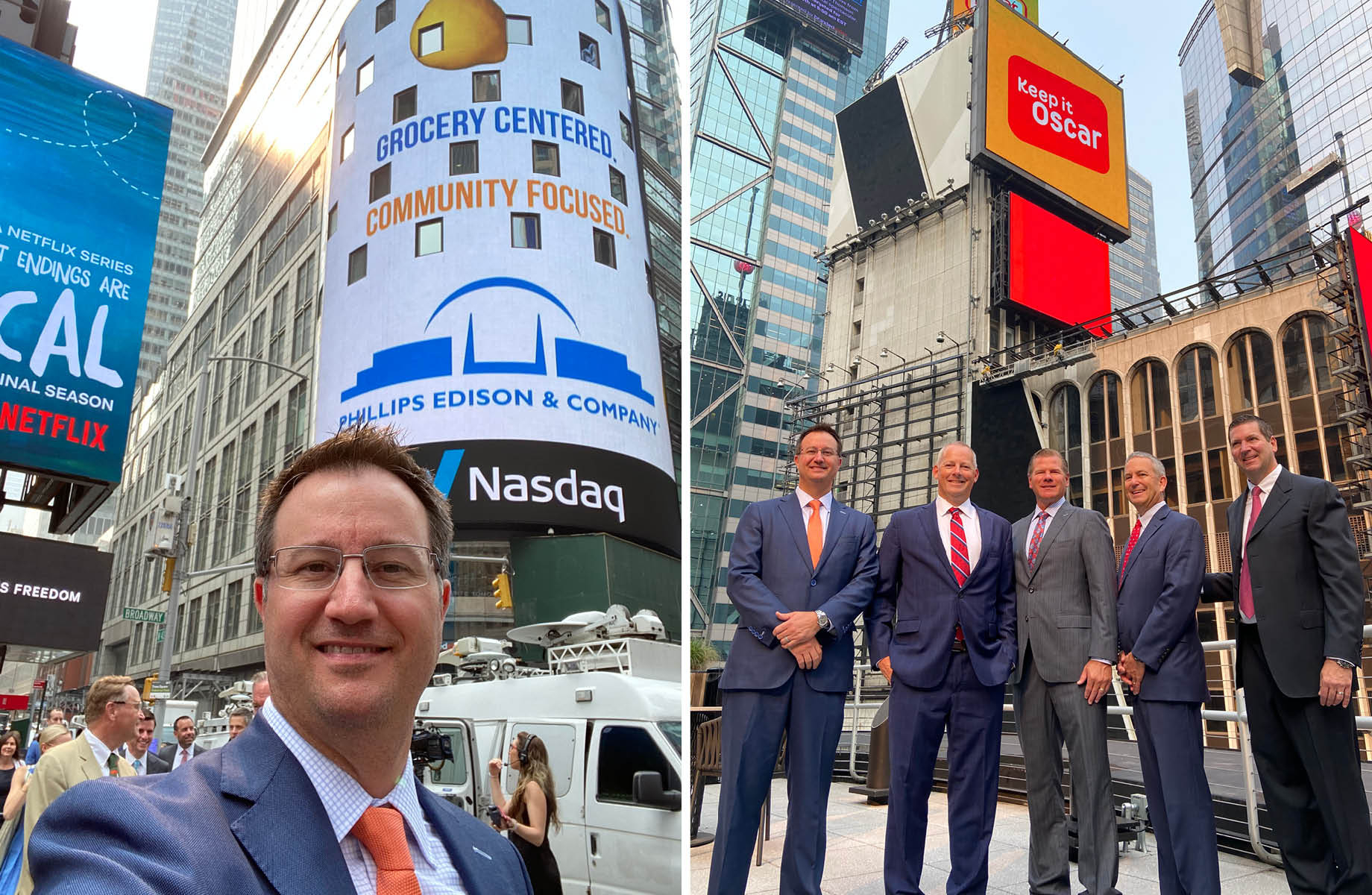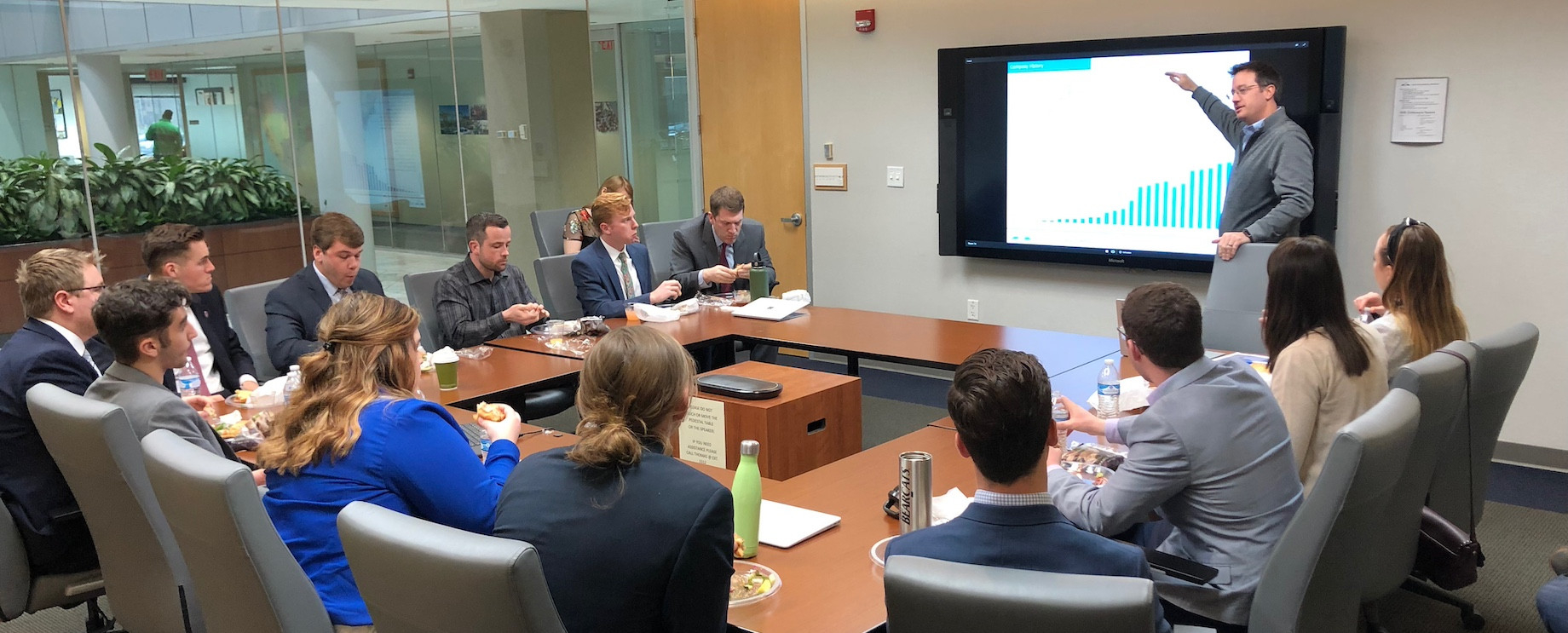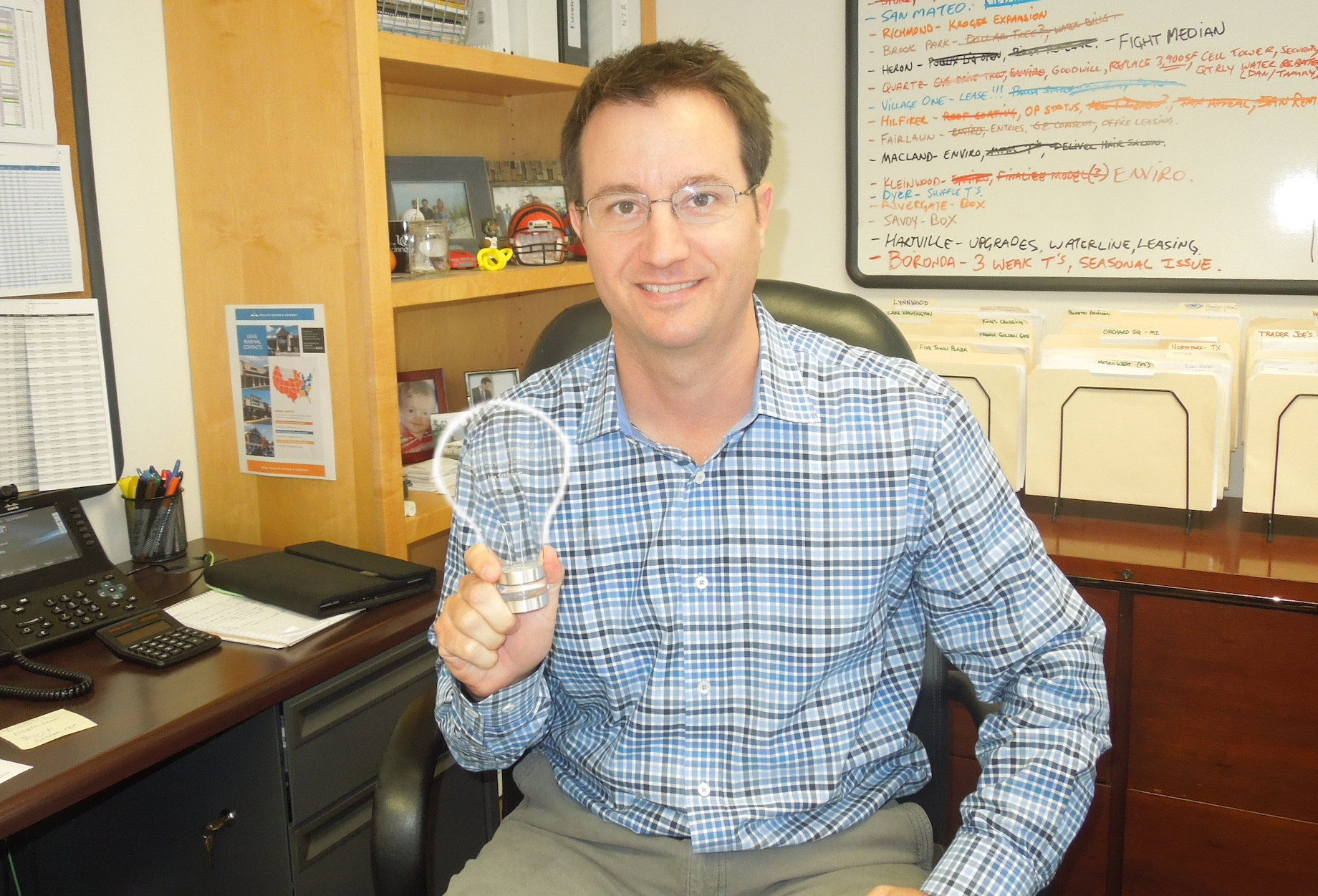Joseph Schlosser was on a path to real estate development at an early age. He may not have been familiar with the exact concept, but he enjoyed hands-on construction, whether with his erector set or building birdhouses with his dad in the working-class Cincinnati neighborhood where he grew up. “I was always interested in buildings and construction because it’s tangible and I think every property has a sense of purpose,” Schlosser said. “You can positively impact communities with new developments and redevelopments.”
His Midwestern work ethic, meanwhile, began in seventh grade with a job as a pharmacy clerk. His post-college career launched in 1998 with a role as a construction manager, and he landed at Phillips Edison & Co. in 2004 as a financial analyst.
After serving in six roles for the company over the past two decades, Schlosser began his stint as COO at the beginning of the year. He succeeded Bob Myers, who took the reins in preparation for Devin Murphy’s planned June 2024 retirement.
Founded in 1991 in Cincinnati, Phillips Edison acquired its first shopping center a year later. It launched a handful of private investment funds beginning in 2000, followed by two nontraded real estate investment trusts a decade later. In 2021, it raised $547.4 million in an initial public offering, and today, it owns nearly 300 grocery-anchored centers across 31 states.

Joe Schlosser and Phillips Edison & Co. executives traveled to New York in July 2021 to ring the Nasdaq opening bell in Times Square following their initial public offering. Pictured left to right are current COO Schlosser, senior vice president of acquisitions and dispositions David Wik, president Bob Myers, senior vice president of tax Joe Hoffman and senior vice president of construction Tony Haslinger.
Schlosser previously served as the company’s first portfolio manager, starting in 2011. Over the past 12 years, he built the role into an eight-member team that manages regional, cross-functional teams covering Phillips Edison’s nationwide portfolio. His new assignment as COO expands his operational responsibilities over the portfolio management, property management, construction management, data science and research teams.
He learned quite a bit in his Phillips Edison journey — which wound from financial analyst to leasing to fund management to operations to portfolio management to COO — and he thus looks forward to delegating as a way to prepare employees for their own next roles, including succeeding him. “I’ve always focused on learning new skills, challenging myself and expanding my comfort zone,” Schlosser said. “Advancing my career was not my main goal, but it has been a natural byproduct of increasing my abilities and knowledge.”
Numbers and Gut Instinct
Schlosser pursued a degree in the relatively new discipline of construction management at the University of Cincinnati from 1992 to 1997. He also participated in the school’s innovative cooperative education program, in which students alternated semesters in the classroom and full-time work in their chosen fields. The initiative was especially helpful because Schlosser needed money to help pay for his education and because he gained relevant work experience. “I actually had building birdhouses on my resume when I was trying to get that first co-op job,” he noted with a laugh. “I had grass-cutting, cashier and janitorial experience but not much construction experience.”

Phillips Edison & Co.’s Joe Schlosser discusses the company’s history, mission and team structure with University of Cincinnati students in 2017 before taking them on a property tour.
The co-op program connected Schlosser with a company that built Meijer supermarkets, and after he graduated, he joined the firm permanently and began managing day-to-day construction activities at various shopping center sites. It was an important but humbling learning experience, he acknowledged. “I was a 23-year-old kid tasked with managing seasoned, skilled and rightfully skeptical workers of the construction industry,” Schlosser recalled. “I had to earn their respect before I could really manage them.”
The job also fueled an interest in real estate development. He thought about the vision developers have for a piece of land and the tools and skills required to make it a reality. Thus, he set his sights on a career change to work for a landlord. “Working on projects that use both sides of the brain has always been intriguing to me,” Schlosser said. “You can have a great development idea, but if the numbers don’t support it, it won’t work. At the same time, you’ve got to have gut intuition and be able to solve problems on the fly.”
From Construction Management to Numbers Guy to Leasing
Thus, he returned to the University of Cincinnati to pursue a Master of Business Administration degree with an emphasis in finance and real estate. To pay for school, he took a construction management job with the university, which was undertaking an ambitious renovation of classrooms and lab space and building a $300 million medical facility on campus.
The coursework introduced him to the numbers side of the commercial real estate business, such as capitalization rates and rent rolls, and when he graduated in 2004, he sought a job in the sector with which he was most familiar: grocery-anchored retail. “Early on, I saw the recession resistance that grocery shopping centers provided, and I also saw how they could be resistant to the internet,” Schlosser explained. “That combination was very appealing to me.”
Schlosser initially interviewed with a competitor, but he was drawn to Phillips Edison’s culture and joined the company as a financial analyst. Although intentional, the career transition and the 35% pay cut proved jarring. Nonetheless, he learned the numbers side of the business quickly by underwriting potential acquisitions and lease deals and securing property loans. “In hindsight, it was the best decision of my career,” he acknowledged.
After thus stimulating the left side of his brain for about 18 months, Schlosser became a leasing agent and exercised the right side, becoming more creative, intuitive and holistic in his thinking. Not only did the commission-based assignment cut his base salary by 50%, the door-knocking also tested the self-described introvert. “I could absorb the reduction in salary — I was on my own at the time and didn’t have to worry about others, and there was plenty of upside if I was successful — but going into a sales role was a scary proposition,” remarked Schlosser, who is married with two teenage boys today. “I wanted to challenge myself to see if I could do it.”

The Schlosser family on a recent vacation in the Dominican Republic
The Jump to People Management and Then Portfolio Management
Schlosser made the jump to leasing manager and by then couldn’t envision going back to a salary; sales provided too much motivation to let go. In 2008, amid the financial crisis, he volunteered to take a demotion to leasing agent. He was the youngest and least experienced manager at the time, he pointed out, and the company took him up on it, as it needed strong production from the agents to shore up a drop in occupancy.
In 2009, he began managing a third-party portfolio of grocery-anchored assets that a mezzanine lender had foreclosed on in Phoenix. In that position, he spearheaded a team effort to reduce expenses and lease up the centers. In 2011, Phillips Edison created a similar position managing the company’s national portfolio and appointed Schlosser to head it up. At this time, he also formally joined Phillips Edison’s investment committee to help guide acquisition and disposition decisions. “In Phoenix, I was ultimately responsible for all aspects of those 12 properties and used all of my finance, leasing and construction management experience,” he said. “We saw the benefit of having someone with a wide range of experience to manage teams across different functions, and it became obvious that the role was needed to guide the entire portfolio.”

Joe Schlosser, a fan of both numbers and creativity, displays his Phillips Edison & Co. Innovation Award in 2014. The honor recognized the creation of the PECO Power Score, which the company uses to quantify the quality of grocery-anchored assets.
Schlosser’s stint as portfolio manager coincided with a period of rapid growth for the company, guided by lessons learned during the global financial crisis. Phillips Edison’s two nontraded REITs raised nearly $3 billion from 2010 to 2015, which fueled the acquisition of hundreds of resilient, necessity-based properties anchored by the No. 1 and No. 2 grocers in their markets. That has better prepared the company for economic disruptions like the pandemic lockdown, he said.
More recently, the REIT has emphasized curbside pickup and buy-online-pick-up-in-store initiatives to build an omnichannel strategy. “Our shopping centers need to be part of the overall retail process,” he stated. “We want brick-and-mortar retailers that also have an online presence or are internet resistant like nail salons and similar services.”
The C-Suite
The current chapter in Schlosser’s career at the REIT represents the culmination of two decades of hard work, education and experience. He has signed off on every new asset over the years, he said, and thinks of them as his children.
Though he faces broader and potentially distracting responsibilities in his new role, it’s a safe bet he’ll never stop thinking about the possibilities of development and redevelopment. “When I see a property, I always wonder if it has reached its full potential. I often take my family to look at grocery-anchored centers, even when we are on vacation,” he confided. “My kids actually enjoy it and often have great ideas and always ask fantastic questions. We talk about various reasons why certain properties appear to be successful or not. This is a timeless question about any property that I enjoy constantly exploring. And it also helps fuel my passion to teach and train potential future leaders in our real estate industry.”
By Joe Gose
Contributor, Commerce + Communities Today